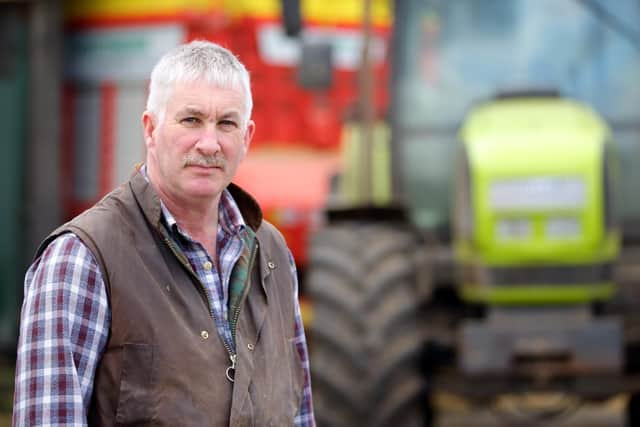Bill amendments provide ‘lifeline’
and live on Freeview channel 276
In response to the publication of proposed amendments, they are urging MLAs to follow the science and back evidence-based changes to the bill, when they meet again to vote on Monday 28 February.
Ulster Farmers’ Union president Victor Chestnutt said: “Much needed amendments have now been proposed providing a lifeline to our agri-food sector and as a sector we are supportive of these amendments. It is an extremely positive development, but we are not over the line just yet.
Advertisement
Advertisement
“Agriculture Minister Edwin Poots and Sinn Féin have proposed amendments on methane that clearly align with the expert advice of the Climate Change Committee and others, and both must be supported. Our MLAs have an obligation to do what is right for rural society and economy, and the environment.


“MLAs have heard the concerns first-hand from our farmers across the country, from the wider-agri-food industry and rural communities. We have stressed to our MLAs that we support climate change legislation that will help us tackle emissions without reducing food production, and now they must work together to ensure a bill is agreed upon that delivers for climate change and everyone in society. The future of our industry is still depending on this.”
Northern Ireland Meat Exporters chief executive Conall Donnelly said: “We welcome the amendments on methane that have been proposed by both Sinn Fein and Minister Poots. We believe that these amendments are entirely complementary and consistent with a sensible, evidence-based, scientific approach. We see both of these amendments working very well together.
“With this in mind, we would like to see MLAs coming together to support both amendments which would give us an ambitious legislative framework that we can work to. With this in place, coupled with the science and innovation that is available at our local research facilities, combined with the right investment, we can become world leaders in high-quality food production helping to feed the growing population while successfully combating climate change at the same time.”
Advertisement
Advertisement
Chief executive for the Livestock and Meat Commission for Northern Ireland Ian Stevenson said: “The Executive’s Climate Change Bill is due to come before the NI Assembly next week for further consideration. As it sits, it is currently unjust in terms of its impact on the agri-food sector. It could potentially lead to 40,000 – 45,000 job losses according to our recent KPMG study.
“We as an industry support climate change legislation and we’re asking MLAs to support meaningful amendments, support rural jobs and support the NI economy.”
Sinn Féin agriculture spokesperson Declan McAleer believes that the climate change amendment to be discussed at Stormont on Monday next better reflects the needs of farming as a whole.
He said:“There has been much attention within the wider community and among farmers in particular about the consequences of this legislation should it pass into law before the 28th March.
Advertisement
Advertisement
“Sinn Féin have engaged extensively with farmers on the doors, in public meetings and through NIAPA and the UFU. We have listened to the valid concerns and questions and we have corrected some misinformation that has been circulated on this important issue.
“Farmers have told us that they support and want to see effective climate action, they want to be part of effective measures to tackle climate change but they do not want to face unfair or disproportionate measures while the big global polluters continue to evade their responsibilities.”
McAleer added: “Climate change legislation is about balancing out the amount of emissions we make with the amount we absorb/sequester across all sectors in society, not just farmers, over the next 28 years.
“In a post-Brexit world, where the British market fills up with cheap imports from Australia, New Zealand and other places, it is important our already highly integrated agri-food industry thrives by taking a strong and consistent island-wide approach.
Advertisement
Advertisement
“This means, for example, beef from the north being included in the Protected Geographical Indication (PGI) status for Irish grass-fed beef, which will maximise opportunities for us across the EU and beyond to secure new markets that want high quality, sustainable produce.
“We want to ensure a Climate Change Act doesn’t disproportionately impact farm families and rural communities so we have proposed amendments to ensure those affected are fully consulted in developing plans to tackle climate change.
“If the legislation is passed plans to tackle climate change can only be agreed after a 16-week public consultation. These plans will also have to be rural proofed, equality proofed, small business impact proofed and would then have to be agreed by the Assembly.”
McAleer concluded:“Farmers, and those from other sectors, will be central to the design and development of these plans.”
Advertisement
Advertisement
Commenting on the latest climate change-related Young Farmers’ Clubs of Ulster (YFCU) president Peter Alexander said that he welcomed the latest developments taking place at Stormont.
He added:“Today’s young farmers will be the people charged with the responsibility of meeting the climate change challenge head-on.
“The latest amendments to the climate change bill take account of the significant role played the various livestock sectors within farming as a whole.
“It also gives young farmers a more realistic target to aim for as they look to the future.